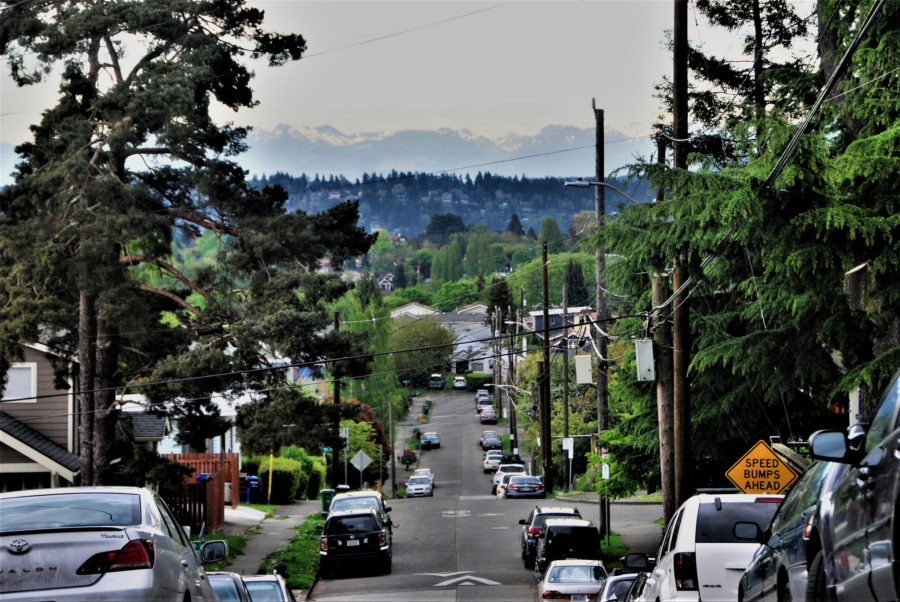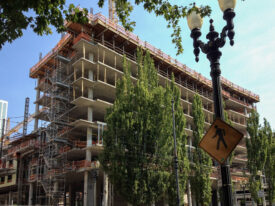Predictions are for suckers. Here at Sightline, we prefer pointed questions.
As our little housing policy team waited this week for our calendars to flip, I cornered each of my colleagues and we cooked up a list of 19 intriguing questions about housing whose answers will be revealed over the course of the next year.
Price trends
Will median home prices in Cascadia’s big urban hubs keep slipping as their recent building booms finally catch up to post-recession housing shortages, and as more landowners start to worry again about empty or unsold homes?
If the Pacific Northwest’s home prices keep falling (even as its local economies keep booming), will that help more people here and elsewhere come around to the many benefits of building enough homes in the places people most want to live?
Duplexes, garden apartments and the “missing middle”
Will Portland finally approve its long-proposed fourplex re-legalization, currently scheduled for summer?
Will state-level bills in Washington and Oregon to legalize more apartment buildings, duplexes, triplexes and quads draw bipartisan and small-town support, or rely entirely on mostly-urban Democratic votes?
Will more cities—Vancouver, BC, for one—echo the zoning reform proposals in Portland and Seattle and require that buildings in low-density zones be smaller if they have fewer homes inside them?
Cottages and ADUs
Will Seattle’s accessory dwelling reform survive the last-ditch appeal from a group of anti-housing activists, to be heard in March and decided in perhaps May? If it does, how quickly will its city council move ADU legislation?
What, if anything, will governments do to remove local laws that discriminate against renters and non-car-owners by banning ADUs on renter-occupied lots or requiring on-site parking even if the residents won’t need it?
Will Renton’s decision to sharply cut ADU development fees lead to another year of rapid growth in suburban ADU construction there, and will the idea spread to other cities? Will Clark County, surrounding Vancouver, Wash., see the same result?
Below-market-rate housing
Will other US cities and regions notice that two suburban Portland counties just voted for big local public-housing bonds and respond to falling federal funding by sending similar measures to their own voters?
Will Cascadia’s housing advocates offer concrete proposals for publicly funding more decentralized, community-led affordable-housing models like co-ops and community land trusts, alongside more traditional housing programs?
Resisting displacement and promoting income integration
Will Oregon’s rent stabilization debate be about whether to set statewide rules, or whether to let cities set rules locally? Either way, can rent be regulated in a way that wouldn’t substantially dim the chance of new homes being built where they’re needed?
Will fallout from British Columbia’s 2018 elections lead the province or its cities to embrace inclusionary zoning, requiring new buildings to include below-market-price homes—and if so, will the policy turn out better-balanced than in Portland and Seattle?
Will Seattle finally pass the heart of its “grand bargain” on housing in the spring after winning a long legal battle, or keep jawboning the plan to legalize more homes, and a new inclusionary-zoning mandate, on 6 percent of the city’s low-density areas?
Parking vs. housing
Will Spokane’s Ben Stuckart ride into mayoral office on a wave of support for lower parking quotas?
Will Portland or Seattle follow the advice of their planning commissions and kill parking quotas in low-density areas?
What’s the smallest Cascadian city that’ll pass some sort of parking reform in 2019?
Beyond Cascadia
As US presidential candidates jockey over housing-justice and climate-justice proposals, who will be first to explicitly link the two?
Will any Republicans (in the US) or Conservatives (in Canada) start to trumpet pro-housing policies from a rightward perspective—and if they do, what effects will that have on local debates?
Will California’s Senate Bill 50, which would strike down apartment bans for owner-occupied homes near transit but not affect rented homes, create a coalition strong enough to overcome suburban opposition to housing legalization? If so, will the same approach work elsewhere?
—
We’ll be tracking all the questions above—and answering most of them, one way or another, on this very website.
That’s the one prediction we’re fully prepared to make.
Sightline’s Dan Bertolet, Anna Fahey, Nisma Gabobe, and Margaret Morales helped with this post.









